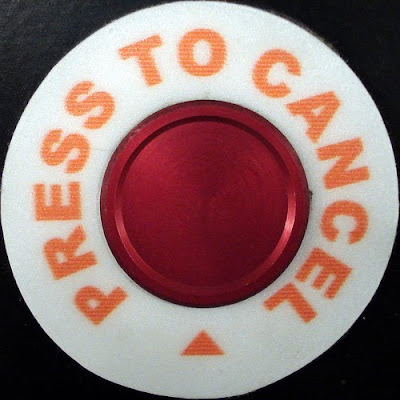This post is meant for anyone who registered for a particular LSAT date, then missed the deadline to postpone (and wishes they hadn't).
, this deadline is earlier than ever before - 3 weeks prior to the test date. (See
The early postponement deadline causes admissions-related dilemmas for anyone who wishes to postpone but missed the deadline.
This post will help you figure out what to do now that you've missed the deadline, and it will show you how to avoid any negative marks on your LSDAS report.
(
Note: LSDAS is LSAC's Credential Assembly Service --- formerly known as the Law School Data Assembly Service. Like
Prince, aka O(+> , they've rebranded. Who said LSAC wasn't hip?)
Here are excerpts from a couple of emails I've received in the past week about missing the postponement deadline:
"Although I've been preparing for a while I am not as far along as I need to be..i.e. I'm still working on the fundamentals- not taking timed tests.
Worse still, due to the "economic crisis" I have to take on a second job starting (you guessed it!) this week.
Having to manage these two jobs over the next two weeks will prevent me from gaining any real ground in my studies. In about a month they should level off and I will return to my 40hour work week.
So, given the new LSAC policies...what should I do? Take the test and cancel my score?
Take the absence?
To me an absence reveals that I am at least intelligent enough to assess myself.
How can an absence be seen as flaky when we now have two weeks for legitimate conflicts to arise? Its not as though I'm waking up the morning of with reservations.
To me a score cancellation reads as a bad performance or an expression of self-doubt.
How do you think admissions will read these two different labels in light of LSAC's new policy?"
"I just spoke to the LSAC people and they inform me that I can't cancel my date, just the score."
What you should do if you've missed the LSAT postponement deadline:
I feel your pain. You've missed the deadline, and LSAC won't let you cancel your "date" beforehand via email or phone.
In the dating world, refusal to take "no" for an answer is considered
a sign of an abusive relationship.
However, it's perfectly acceptable in the world of law school admissions. Go figure. (That's just a joke, LSAC. I ♥ you guys.)
You have 4 main options:
Option #1: Just don't show up to the LSAT. Why miss work or school to run a pointless errand when you already told LSAC you weren't going?
Option #2: Show up to the LSAT and cancel without taking the exam.
Option #3: Show up to the LSAT and take the exam to get a sense of what your "real" LSAT test center experience will be like in September (or December). Cancel after the exam.
Option #4: Show up and take the exam even though you don't feel ready. Don't cancel and let the score stay on your record, whatever it may be.
After hearing from a few admission officers, it turns out that
Option #1 is fine, despite the fact that you might think it appears irresponsible. When I emailed
Dean Edward Tom of UC Berkeley at Boalt Hall about a student who'd been an LSAT absentee, Dean Tom said, "No, it shouldn't prejudice her application. She may wish to provide a short explanation via an addendum."
Option #4 isn't a good idea because you also don't want a low LSAT score on your record. Even if the schools you're considering don't average scores, one high LSAT score still looks better than a low score and a high one. Take it once and get it done right the first time.
Option #2 is fine. You can show up and immediately cancel when the exam starts. Many other students will end up having to do the exact same thing.
However,
Option #3 may be even better. You've already paid the full fee. Since you missed the postponement deadline, you won't get any of your money back anyway, and you'll already have a cancellation on your record.
Why not take the opportunity to get used to the test center experience? Just cancel your score at the very end of the exam. Doing this will make September seem much less scary.
However, there's one big reason that you might consider
Option #1 over
Option #3:
Score cancellations count towards the no-more-than-3-LSATs-per-2-years-rule, while absences don't.
I recently emailed LSAC to double-check this. LSAC replied, "An absentee does not count as one of the three times that you can take the test in the two year period."
If you suspect that you might end up needing all 3 LSATs over a 2-year period, being absent is probably the better choice.
How the earlier LSAT postponement deadline will affect admission officers' views on score cancellations:
As things currently stand, LSAC score reports will not distinguish between:
- Students who show up on test day and cancel their test registration because they couldn't do so after they missed the postponement deadline.
- Students who didn't decide to cancel until during or after the exam.
However, score reports
do distinguish between score cancellations and absences.
Due to the earlier LSAT postponement deadline, increasing numbers of applicants will have score cancellations and absences on their records. For this reason, I suspect that score cancellations and absences will have fewer negative connotations than they previously did.
(This creates a silver lining for students who didn't plan to cancel their scores on test day, but then something unexpected occurred. These students will "luck out" due to this ambiguity on the score report.)
I asked Dean Tom to comment on how admissions deans will consider LSAT cancellations in light of the now-earlier postponement deadline:
"Things will become more relaxed. They will at Berkeley. I think it's always a good idea to provide an explanatory addendum, regardless of the reason. "
After I published this blog post on Thursday afternoon,
Anna Ivey, former Dean of Admissions at University of Chicago Law School (and
independent law school admission consultant) wrote:
I agree 100% with your advice. It may sound counter-intuitive, but a cancellation actually looks better than a no-show. I always tell applicants that one cancellation is not the end of the world -- everyone can have a bad day, and admissions officers know that. I don't think they look askance at one cancellation (or at least I never did when I was an admissions officer). More than one cancellation does start to make you look flaky, though, so if you cancel the June test, you've basically used up your one non-flaky-looking cancellation. Please don't wake up with the flu in September, and if you do, then that's a good reason to write an addendum (canceling more than once).
So if you need to physically show up at the test anyway just to be able to cancel it (and avoid a no-show on your record), why not stick around and get the upside of a practice LSAT in a real testing environment? Don't keep the score though. There's no point in having a score from a day when you aren't feeling in peak form. With the LSAT, it's best to take one bite at the apple. Do it once, and do it right.
Also be sure to see Anna Ivey's more recent thoughts at the end of this blog post.
Dean Sarah Zearfoss of the University of Michigan Law School emailed me on Friday afternoon:
Having a single "absence" show on a report is absolutely nothing from an admissions officer's perspective--unlike a cancellation, an absence means that you were never exposed to the test, and so it doesn't look like you got one free run-through before getting a score. (And to be clear, having a single cancellation doesn't look weird, either--although a pattern may.) Of course, having multiple absences does start looking a little flaky, so it is true that a candidate needs to be very careful to clear his/her calendar for October or December and be sure to show up for the test--or, at least, to postpone the test in accordance with LSAC's timeline.
I note that originally, it seemed a little unfair to me that someone would have an absence b/c it seemed wrong to treat someone who tried to alert LSAC to the forthcoming absence three weeks in advance with a candidate who, say, just didn't show up. But upon further reflection, I changed my mind, concluding that there's just no good way to make a distinction between "people who are behaving as responsibly as possible but who missed the applicable deadline" and "people who simply were blase and didn't show up." At least--I can think of a million hypotheticals where whatever distinction you make ends up being the wrong one (which may simply be the result of my law school training). After all, it is true that however excusably (for example, one candidate we've heard from is a paralegal who now has a trial scheduled for the week of the LSAT), the candidate hasn't satisfied the timeline posted and explained by LSAC. It's not a big deal at all, but a notation of absence seems to me to accurately reflect the situation.
UPDATE (December 4, 2009):
I've left some additional thoughts on the decision of whether to cancel or be absent in the comments on this blog post
here.
UPDATE (February 2, 2010):
I received the following email from Anna Ivey (who is also quoted above):
I've been fielding some questions about what I said in this blog post. On reflection I'm thinking that applicants SHOULD go with a no-show rather than a cancellation after all if it's too late to reschedule the test. I talked to a number of admissions officers about this, and while there is some split in opinion, the no-show camp ended up persuading me.









